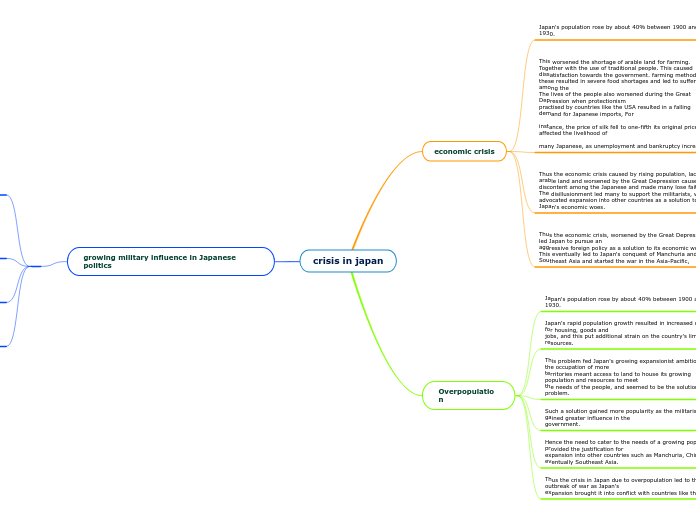crisis in japan
economic crisis
Japan's population rose by about 40% between 1900 and 1930.
This worsened the shortage of arable land for farming. Together with the use of traditional people. This caused dissatisfaction towards the government. farming methods, these resulted in severe food shortages and led to sufferings among the
The lives of the people also worsened during the Great Depression when protectionism
practised by countries like the USA resulted in a falling demand for Japanese imports, For
instance, the price of silk fell to one-fifth its original price. This affected the livelihood of
many Japanese, as unemployment and bankruptcy increased.
Thus the economic crisis caused by rising population, lack of arable land and worsened by the Great Depression caused discontent among the Japanese and made many lose faith in - The disillusionment led many to support the militarists, who advocated expansion into other countries as a solution to Japan's economic woes.
Thus the economic crisis, worsened by the Great Depression, led Japan to pursue an
aggressive foreign policy as a solution to its economic woes.
This eventually led to Japan's conquest of Manchuria and Southeast Asia and started the war in the Asia-Pacific,
Overpopulation
Japan's population rose by about 40% between 1900 and 1930.
Japan's rapid population growth resulted in increased demand for housing, goods and
jobs, and this put additional strain on the country's limited resources.
This problem fed Japan's growing expansionist ambitions, as the occupation of more
territories meant access to land to house its growing population and resources to meet
the needs of the people, and seemed to be the solution to its problem.
Such a solution gained more popularity as the militarists gained greater influence in the
government.
Hence the need to cater to the needs of a growing population provided the justification for
expansion into other countries such as Manchuria, China and eventually Southeast Asia.
Thus the crisis in Japan due to overpopulation led to the outbreak of war as Japan's
expansion brought it into conflict with countries like the USA.
growing military influence in Japanese politics
The political climate in Japan was increasingly unstable in the 1930s, as the militarists attempted to gain more power.
The assassination of Prime Minister Inukai (who opposed Japan's invasion of Manchuria)
ended parliamentary rule. Martial law was declared and a 15-member cabinet, two-thirds of which were military
figures, meant that the military effectively controlled the government. Concessions were
granted to the military in the hope of preventing further political violence.
The increasing influence of the military in Japanese politics created a political climate that
favoured an aggressive foreign policy and set the stage for Japanese expansion in the Asia-
Pacific.
Thus the growing influence of the military in Japanese politics and its adoption of
an aggressive foreign policy brought Japan into direct conflict with Western powers,
eventually leading to war being declared on Japan in 1941.
